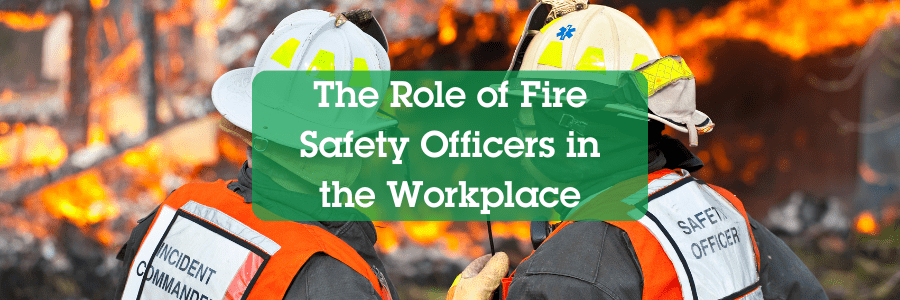Role of Fire Safety Officers in the Workplace
In the ever-evolving landscape of workplace safety, the role of Fire Safety Officers is undeniably vital, especially where strict regulations are in place to protect employees and property.
The Role of Fire Safety Officers
Fire Safety Officers are the frontline defenders against the devastating impact of fire incidents in the workplace. Their primary responsibility is to develop and implement comprehensive fire safety strategies. This includes conducting risk assessments, creating emergency response plans, and ensuring that all employees are adequately trained in fire safety protocols. Additionally, Fire Safety Officers play a crucial role in regularly inspecting fire safety equipment, such as extinguishers and alarms, to guarantee their functionality.
Fire Safety Officers are entrusted with key responsibilities that are instrumental in maintaining a secure workplace. Here is an overview of a Fire Safety Officers primary duties:
- Fire Risk Assessment: Conduct comprehensive fire risk assessments to identify potential fire hazards in the workplace. This involves evaluating the layout, equipment, and processes to ensure effective risk mitigation.
- Fire Safety Policy Development: Collaborating with the management team, Fire Safety Officers play a crucial role in developing and implementing fire safety policies. These policies serve as guidelines for all employees, outlining the necessary precautions and procedures to prevent and respond to fire incidents.
- Fire Safety Training: Organising and delivering fire safety training programs for all staff members. This includes educating employees on fire prevention measures, the proper use of firefighting equipment, and evacuation procedures.
- Emergency Response Planning: Developing and implementing effective emergency response plans specific to fire incidents. Fire Safety Officers ensure that all employees are well-prepared to respond promptly and safely during a fire emergency, conducting regular drills to reinforce these procedures.
- Fire Equipment Maintenance: Oversee the regular maintenance and inspection of firefighting equipment, such as extinguishers, fire alarms, and sprinkler systems. This ensures that all equipment is in optimal working condition in case of an emergency.
- Regulatory Compliance: Staying up-to-date with fire safety regulations and codes, and ensuring the organisation complies with all relevant standards. Regular audits and inspections are conducted to uphold a high standard of fire safety.
- Investigation and Reporting: In the unfortunate event of a fire incident, Fire Safety Officers lead investigations to determine the root causes and provides detailed reports. This information is crucial for implementing preventive measures and improving overall fire safety.
Legal Expectations and Compliance
Most countries have a robust legal framework in place to ensure that workplaces adhere to stringent fire safety standards. Fire Safety Officers must familiarise themselves with legislation such as the Regulatory Reform (Fire Safety) Order 2005, which places the duty of ensuring fire safety on designated responsible persons, which often includes Fire Safety Officers. Compliance with these regulations is not only a legal obligation but also a fundamental step towards creating a secure work environment.
Potential Legal Implications and Consequences
The failure to meet fire safety requirements can have severe legal consequences. Fire Safety Officers may find themselves and their organisations facing legal action, fines, or even imprisonment in cases of gross negligence. The legal implications extend beyond financial penalties, as damage to reputation and the potential closure of the business are also plausible outcomes. Therefore, Fire Safety Officers must remain vigilant in their duties to avoid legal repercussions.
The consequences of inadequate fire safety measures are far-reaching and can be catastrophic. In the event of a fire, lives are at stake, and the physical and emotional toll on individuals can be immense. Beyond the human impact, property damage can be extensive, leading to financial losses and disruptions to business operations. Failure to prevent and manage fire incidents can result in the erosion of trust among employees, clients, and shareholders.
An Overview of a Fire Safety Officer’s Role
Fire Safety Officers shoulder a weighty responsibility in safeguarding workplaces against the devastating impact of fire. The expectations placed upon them are not only moral but also legal, with strict regulations governing fire safety in the workplace. The potential consequences of neglecting these duties are severe, ranging from legal action and financial penalties to irreparable damage to lives and property. By recognising the critical nature of their role, staying informed about relevant legislation, and implementing robust fire safety measures, Fire Safety Officers contribute significantly to creating a safer and more resilient working environment.








Leave a Reply
Want to join the discussion?Feel free to contribute!